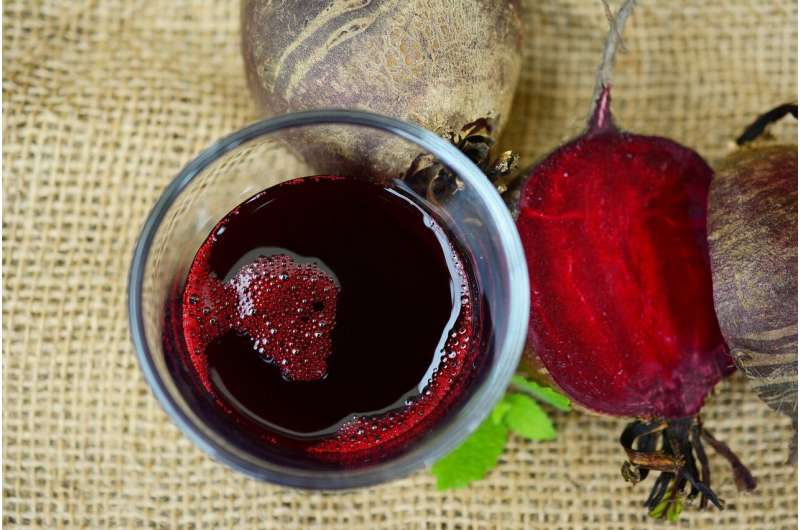Changes in mouth bacteria after drinking beetroot juice may promote healthy aging

Drinking beetroot juice promotes a mix of mouth bacteria associated with healthier blood vessels and brain function, according to a new study of people aged 70-80.
Beetroot—and other foods including lettuce, spinach and celery—are rich in inorganic nitrate, and many oral bacteria play a role in turning nitrate to nitric oxide, which helps to regulate blood vessels and neurotransmission (chemical messages in the brain).
Older people tend to have lower nitric oxide production, and this is associated with poorer vascular (blood vessel) and cognitive (brain) health.
In the new study, by the University of Exeter, 26 healthy older people took part in two ten-day supplementation periods: one with nitrate-rich beetroot juice and another with nitrate-free placebo juice, which they drank twice a day.
The results showed higher levels of bacteria associated with good vascular and cognitive health, and lower levels of bacteria linked to disease and inflammation.
Systolic blood pressure dropped on average by five points (mmHg) after drinking the beetroot juice.
"We are really excited about these findings, which have important implications for healthy aging," said lead author Professor Anni Vanhatalo, of the University of Exeter.
"Previous studies have compared the oral bacteria of young and older people, and healthy people compared to those with diseases, but ours is the first to test nitrate-rich diet in this way.
"Our findings suggest that adding nitrate-rich foods to the diet—in this case via beetroot juice—for just ten days can substantially alter the oral microbiome (mix of bacteria) for the better.
"Maintaining this healthy oral microbiome in the long term might slow down the negative vascular and cognitive changes associated with aging."
The researchers ran tests to identify clusters (or "modules") of oral bacteria that tend to thrive together in similar conditions.
A module (Prevotella-Veillonella) that has been associated with inflammation was reduced after nitrate supplementation, including a decrease of Clostridium difficile (which can infect the bowel and cause diarrhea).
Professor Vanhatalo stressed that more research is needed to confirm the findings and see whether similar effects are found in other groups.
"Our participants were healthy, active older people with generally good blood pressure," she said.
"Dietary nitrate reduced their blood pressure on average, and we are keen to find out whether the same would happen in other age groups and among people in poorer health.
"We are working with colleagues in the University of Exeter Medical School to investigate interactions between the oral bacteria and cognition to better understand the how diet could be used to delay cognitive decline in older age."
Much research has been conducted into the benefits of a healthy gut microbiome, but far less is known about the oral microbial community, which plays a crucial role in "activating" the nitrate from a vegetable-rich diet.
The study was funded by the Dunhill Medical Trust, and the research team included Cardiff University.
The paper, published in the journal Redox Biology, is titled "Network analysis of nitrate-sensitive oral microbiome reveals interactions with cognitive function and cardiovascular health across dietary interventions."
More information: Anni Vanhatalo et al. Network analysis of nitrate-sensitive oral microbiome reveals interactions with cognitive function and cardiovascular health across dietary interventions, Redox Biology (2021). DOI: 10.1016/j.redox.2021.101933


















